|
Photo Gallery
I have been grateful to hear from Oklahomans across the state at town hall-style Community Conversations at which I provide a brief update and then take questions from the community.

Community Conversation in Durant
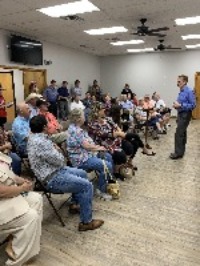
Community Conversation in Calera
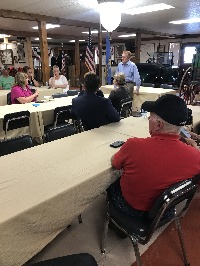
Community Conversation in Jay

Community Conversation with the Grove Rotarians

Community Conversation in Miami
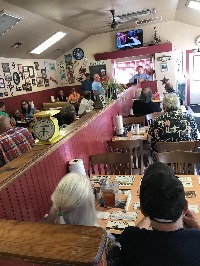
Community Conversation at the Main Street Diner in Chelsea
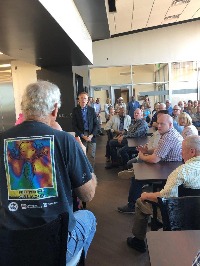
Community Conversation in Enid

Community Conversation in Hennessey

I received an update on flooding and damage at Kaw Lake from the tremendous rain we had this spring.
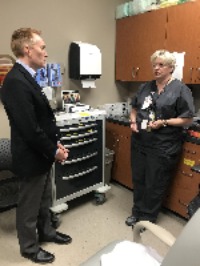
I had the opportunity to stop by the VA clinic in Vinita during my travels in NE OK. The staff there discussed tele-medicine and other health-related items for our veterans to receive the best care. Keep up the good work!

I was glad to get a chance to tour the Palomar Family Justice Center in OKC, where they provide hope and healing to victims of domestic violence.

I met some of the graduates of the Prison Fellowship Academy in OKC, a voluntary, faith- and values-based program for inmates. The graduates completed 500 hours of faith- and values-based curriculum, which ultimately helps reduce recidivism once they make their way back to society. Congratulations!
|
Dear Oklahoma friends and neighbors:
The Senate is typically in session for 11 out of 12 months of the year. August is the one month that allows me time to travel around the state and hear from Oklahomans about their ideas, perspectives, and concerns. During just the last couple of weeks, I’ve already had opportunities to visit with folks in Calera, Chelsea, Chickasha, Durant, Enid, Eucha, Grove, Hennessey, Jay, Kaw Lake, Lawton, Miami, Oklahoma City, Shawnee, Vinita, and several other locations. I have met with leaders from our VA clinics and hospitals, the Corps of Engineers, domestic violence prevention, tribes, prisons, local law enforcement, education, nonprofits, and manufacturing, and I have held multiple Community Conversations (town halls).
If we haven’t been able to connect in person yet, please continue to reach out. You can visit my website at www.lankford.senate.gov or follow me on social media – @SenatorLankford. Please stay engaged with my office with your comments, questions, and concerns. Our whole team is honored to serve our state and nation.
Gun Laws
Any time we face the loss of innocent life, we come together in our communities to grieve for those families affected and to ask the difficult but important questions of how this happened and how we can prevent it from happening in the future. The recent shootings in Dayton, Ohio, and El Paso, Texas, are two more examples of how this trend toward violence against perfect strangers is affecting our communities.
There are laws on the books that aim to prohibit criminals from possessing firearms of any type. Anyone who has been convicted of a felony or misdemeanor domestic assault; who has a victim’s protection order against him or her; who has been dishonorably discharged from the military; who uses federally illegal drugs, including marijuana; or who has been deemed by a court to be mentally unstable/institutionalized cannot own, possess, or purchase a firearm.
In 2018, Congress passed the Fix NICS bill, which I cosponsored, in order to improve the information in the federal background check system known as the National Instant Criminal Background Check System (NICS), which is maintained by the FBI. We also passed additional funding for schools to ensure they can help prevent school shootings. Before Fix NICS there were gaps in the information provided to the background check system that allowed some people who should not qualify to buy a gun to get through the system. We now have dedicated resources and information to improve our background system.
There has also recently been conversation about implementing “red flag” laws. Currently, 15 states, not including Oklahoma, have state Extreme Risk Protection Order (ERPO) or “red flag” laws that are designed to protect life and property by giving a court the ability to temporarily restrict a high-risk individual from accessing a firearm. ERPO laws are referred to as “red flag” laws because they allow either a family member, roommate, significant other, or law enforcement officer to petition the court to issue the temporary removal of a firearm. Then the owner has to go to court to petition the court to have his or her constitutional right restored. As I mentioned above, if a court has ruled a person mentally unstable or if he or she has been admitted to a mental institution, he or she already cannot own, possess, or purchase any firearm. It is very likely that the complete mental health information is not getting into the NICS system, and that needs to be corrected. But completing that information does not require stripping a constitutional right or denial of due process.
It is currently in law that a licensed seller must be able to verify through a background check that the buyer can lawfully own or purchase a firearm. An individual can be held criminally liable if he or she sells a gun to a person who cannot legally own a firearm. Additionally, all gun sales by a licensed seller across state lines currently require a background check, including internet sales.
I had a very good conversation with some of our federal partners in Oklahoma about ways they are already increasing enforcement of federal firearm laws and specific ways they can partner with local law enforcement to keep guns out of the hands of people who cannot legally own a firearm
No law can resolve the heart of our culture of violence. Our churches, our communities, and our families are going to have to do the hard work of addressing the increasing tendency toward violence and hatred. Social media, video games, movies, and television contribute constant streams of hatred, violence, and anger. While I continue to work on legislative action and pray for the victims of violence, I will also continue to remind families around our state about the challenges of mental illness, the risks of violence in our culture, and how we can each make a difference. I have already begun the process of reviewing some of the firearms bills before the Senate, and I will work with my team to research and provide options on this difficult issue.
Opposed Debt Ceiling Increase
On August 1, the Senate voted on a two-year budget number that also included a debt ceiling increase. I opposed the legislation, but it ultimately passed the Senate and House and was signed by the President.
The United States is the only country in the world with a statutory debt ceiling. It was created decades ago to force Congress to consider the size of our national debt and ways to solve our debt. In the past I have supported a debt ceiling increase only if the legislation included real spending reforms to address our debt and deficit. We cannot solve our debt with a single vote, but we can make progress if we will debate and decide the steps to help our country out of debt. Unfortunately, the debt ceiling/budget vote this year did not even consider a single dollar of savings. Instead, it added billions in new spending and ignored the future consequences. We should have pursued a plan to address both our immediate fiscal challenges and provide a path to pay down our debt. I continue to work with a few Members of Congress—both Republicans and Democrats—to change the way we budget and to fix our obvious debt problem.
As we go forward, we still need to consider and pass legislation to fund the federal government before the end of the fiscal year (September 30) to avoid another government shutdown. Along with Senator Maggie Hassan from New Hampshire, I have pressed the Senate to consider our Prevent Government Shutdowns Act, which would ensure that Washington dysfunction will not unfairly hurt federal families and the basic operation of our government. Our bill would keep the government funded and force Members of Congress and members of the President’s Office of Management and Budget to remain in Washington, DC, until we resolve the funding issue, but it would not hurt the American people. It would also require Congress to stay in session every day—weekdays and weekends—until all appropriations bills are signed into law. Simply put, Congress cannot leave until the work is done.
To learn more about the Prevent Government Shutdowns Act, CLICK HERE.
To watch a recent joint Fox Business interview with Senator Hassan on the Prevent Government Shutdowns Act, CLICK HERE.
UPDATE: Prescription Drug Prices & Health Care Costs
For months, Oklahomans have been frustrated with rising costs of prescription drugs and health care delivery in our nation. Starting in January of this year, one of my committees, the Finance Committee, which has jurisdiction over about 40 percent of federal spending, including Social Security, Medicare, Medicaid, and other areas, started hearings on drug prices.
The Finance Committee has held several hearings to understand the complexity of drug pricing, including the steps a drug takes as it goes from research to medicine. During these months I have questioned drug company executives, pharmacy benefit managers (PBMs), insurance company executives, the Secretary of Health and Human Services (HHS), Alex Azar, pharmacists, and patients about the rising costs of some drugs and how some in the industry fight behind the scenes to block new generic drugs from coming to the market.
In April, Finance Committee Chairman Chuck Grassley and I introduced the bipartisan Prescription Pricing for the People Act, which would require the Federal Trade Commission (FTC) to study the role and recent merger activity of PBMs that have created an anticompetitive environment in the drug industry. On July 25, I joined a bipartisan group of senators to introduce the Phair Relief Act, Transparency for Pharmacists Act, and the Right Price for Medicare Act. These bills will help lower drug costs for seniors and improve financial certainty for community pharmacies and provides an opportunity to resolve in law many of the issues we have debated during Senate Finance Committee hearings regarding PBMs and their interactions with pharmacies and patients. Varying drug prices and a lack of relief continue to frustrate Oklahomans, but local pharmacies are limited in how they can respond by PBM fees, rules, and cost issues. I look forward to full consideration of these and other bills to address rising drug prices.
For more information on the Phair Relief Act, CLICK HERE.
For more information on the Transparency for Pharmacists Act and the Right Price for Medicare Act, CLICK HERE.
We still have a tremendous amount of work to do to actually get at the root causes of the rising costs in prescription drugs and health care. We need to fix our drug pricing system, which has been exploited to hoodwink consumers into thinking a generic and brand-name drug are actually the same cost by placing them on the same drug pricing tier.
Additionally, regarding health care, “surprise billing” keeps coming up as a major issue for patients who think they are receiving in-network care, testing, or imaging because the facilities are often located in the same building as their in-network provider. Then, a few months later they receive a huge bill from the lab, radiologist, or specialist that they were not told were “out of network.” We need to fix that, and I believe we can and should fix the surprise billing issues when Congress returns this fall.
To watch my recent floor speech on my work to address the rising prescription drug prices, CLICK HERE.
UPDATE: Border Visit
In July, I toured the Rio Grande Valley sector of the southern border near McAllen, TX, with Senators Joni Ernst of Iowa and Bill Cassidy, MD, of Louisiana. I requested the tour in order to provide oversight of facility conditions and operations and further assess the areas Congress needs to address in our immigration, asylum, and detention laws. The federal law enforcement professionals along the border are working hard to protect our nation, honor the law, and manage a constant stream of people illegally crossing, especially the high number bringing infants and small children with them.
For more information on our tour of the facilities and border, CLICK HERE. To listen to my floor speech detailing the trip, CLICK HERE. For photos from the visit, CLICK HERE.
I serve on the Senate Homeland Security and Governmental Affairs Committee (HSGAC) and the Homeland Security Appropriations Subcommittee, which have jurisdiction over the Department of Homeland Security (DHS). HSGAC continues to hold hearings with Customs and Border Protection (CBP), Immigration and Customs Enforcement (ICE), and HHS officials to continue to get the facts about what’s happening at our borders, our immigration and asylum court proceedings, and our law enforcement efforts to end human trafficking and drug smuggling. I remain committed to the idea that Congress must fix the legal loopholes and inefficiencies in our immigration system in law. We should not rely on executive actions or court cases to ensure we foster legal immigration, prevent illegal immigration, and ensure children and adults in our detention facilities are safe and clean and are being processed quickly. Congress must act on this, and I look forward to actually getting a bill on the Senate floor to help fix this situation and prevent us from getting here again.
Keeping You in the Loop
- On July 18, I introduced my bipartisan, bicameral bill to encourage federal transparency, called the Taxpayers Right-to-Know Act. My bill would require the federal government to make public the details, costs, and assessments related to every federal program. Currently, taxpayers send their hard-earned dollars to Washington and never really know how they are used, where they go, and the effectiveness of the programs they fund. I look forward to ironing out any issues in this bill to see it passed in both chambers soon and signed by the President. CLICK HERE to learn more about the bill.
- On August 8, Senator Rick Scott from Florida and I introduced the Disaster Contract Transparency Act to improve the disaster contracting process on the federal, local, and state levels of government following natural disasters. The bill will protect victims of natural disasters by ensuring post-disaster services are delivered quickly and taxpayer dollars are spent solely on helping impacted communities. Last year, the Government Accountability Office reported that, as of May 31, 2018, the Federal Emergency Management Agency (FEMA) and the US Army Corps of Engineers (USACE) executed $4.5 billion in advance contract obligations—about 56 percent of the total obligations made by these agencies for response and recovery efforts—for three hurricanes and California wildfires in 2017. This important bill will help protect taxpayers from price gouging on debris removal services once the federal government decides to offer FEMA assistance.
- On August 17, Cindy and I volunteered with the annual “Love OKC” back-to-school event where many community organizations, faith-based organizations, and nonprofits work together to provide free medical care, dental care, job interviews, haircuts, groceries, family portraits, and much more to the community. I am proud of so many Oklahomans and Oklahoma non-profits that quietly serve our neighbors every day. If you are not serving our state in practical ways, find a nonprofit and get involved in making our state stronger, smarter, and safer.
- Congress continues to work through the new version of United States-Mexico-Canada Agreement (USMCA), an updated version of the North American Free Trade Agreement (NAFTA). Constitutionally, the House of Representatives must take up the new trade agreement first before the Senate can vote. For the sake of our agricultural business and manufacturing, transportation, and energy sectors, I encourage Speaker Pelosi and the US House to bring it up for a vote. I believe the USMCA already has enough votes to pass, but it has not had a vote yet. The agreement is definitely an improvement in many areas over NAFTA and a critical agreement for Oklahoma’s largest trading partners. On June 18, I spoke again to US Trade Representative (USTR) Robert Lighthizer about the benefits of moving away from NAFTA and toward the USMCA, as it relates to American manufacturing, American wheat and dairy, and the further protection of digital trade items. CLICK HERE to watch my Q&A with USTR Lighthizer on the benefits of the USMCA.
- On July 23, the Senate Finance Committee held a hearing on preventing elder abuse and some of the steps states are taking to ensure well-vetted staff, safe and clean facilities, and mistake reporting in a timely manner. We must make sure our nation’s senior adults have access to quality care and that senior care facilities represent the kind of care our families would want for their loved ones. To hear my Q&A from the hearing, CLICK HERE.
- The Senate continues to work to confirm Executive and Judicial Branch nominees. We have already confirmed 144 judges and continue to work through the important process of vetting, advice, and consent. The number of confirmations now exceeds the number of current vacancies (112). On August 14, President Trump announced his intent to nominate Jodi Dishman to serve as US District Court Judge for the Western District of Oklahoma. Jodi’s extensive experience makes her a well-qualified nominee to serve as a District Court Judge for the Western District of Oklahoma. I thank her for accepting the call to serve our nation and state in this role. I look forward to full Senate consideration of this and other nominations in the days ahead. To read the full release, CLICK HERE.
- Continuing to receive unwanted robocalls? In May, the Senate passed the bipartisan TRACED Act, which enhances enforcement against the most abusive robocalls to landlines and mobile devices, ensures the adoption of call authentication, and evaluates strategies to improve enforcement and deterrence of domestic and foreign abusive robocalls. The Federal Communications Commission (FCC) and the Federal Trade Commission (FTC) are continuing to crack down on and eliminate as many robocalls as possible by finding and prosecuting the robocallers and working on new technology to help carriers and consumers combat unwanted robocalls. There are a number of resources available to help at least slow the number of calls you receive. To access the FCC’s Unwanted Robocalls and Texts page, CLICK HERE. To access the FCC’s Consumer Complaint Center to report a number, CLICK HERE. To add your number to the FTC’s national Do Not Call registry, CLICK HERE, and to add your number to Oklahoma’s Do Not Call Registry, CLICK HERE.
- On August 14, the Federal Motor Carrier Safety Administration announced a proposed rule to modify hours of service rules for commercial motor vehicle drivers. The goal of the proposed changes is to provide additional flexibility for drivers while maintaining safety on our nation's roads through proposals such as lengthening the maximum on-duty period for drivers operating under the short-haul exemption from 12 to 14 hours and allowing drivers to take a break of up to three hours while pausing their 14-hour driving window. The comment period will be open for 45 days. To see the complete list of proposed changes and to comment, CLICK HERE.
- On August 12, the Department of the Interior (DOI) announced it would finalize changes to rules administering the Endangered Species Act (ESA). While the ESA serves the noble mission of ensuring we protect the biodiversity of our precious lands, it is in dire need of modernization. It has a dismal successful delisting rate of less than two percent while putting strict requirements on land development and sometimes creating slush funds supposedly for conservation efforts that in reality have very little oversight or accountability. The changes include commonsense reforms, such as stopping the practice of automatically offering the more stringent full "endangered" species protections to species listed under the lower "threatened" listing and requiring that when DOI examines a potential listing, it first considers only candidate species’ critical habitats to avoid burdensome regulations in unoccupied areas. To read more about DOI's changes, CLICK HERE.
- On August 14, the US Department of Labor’s Office of Federal Contract Compliance Programs (OFCCP) announced plans to clarify the civil rights protections for religious organizations that contract with the federal government. This is an important clarification that is needed for Americans and faith-based organizations who exercise their constitutional right to live their faith when contracting with the federal government. In the past faith-based contractors have faced discrimination simply because of their faith. In America we do not require an organization to give up faith to participate in their government. For more information on this rule, CLICK HERE.
In God We Trust,

James Lankford
United States Senator for Oklahoma
Stay Connected!
If you would like more information on these topics or any other legislation currently before the US Senate, please do not hesitate to call my DC office at (202) 224-5754. My Oklahoma City office can be reached at (405) 231-4941 and my Tulsa office at (918) 581-7651. You can also follow me on Facebook or Twitter or Instagram for updates on my work in Congress.
Notice: If you wish to stop ALL electronic communications from my office, visit this link to opt out permanently from this list. If you have any questions about this Notice or your right to decline future electronic mail from this office, please contact us at United States Senate, 316 Hart Senate Office Building Washington, DC 20510.
|